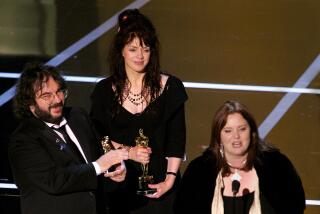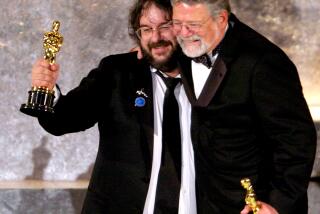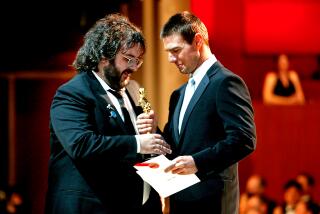Review: ‘Tolkien’ fails to open a window into the mind behind ‘The Lord of the Rings’
What would J.R.R. Tolkien have made of “Tolkien,” the touching, polished, impeccably well-behaved new movie about his early life? The author’s estate has already weighed in, distancing itself from a project that moved ahead without its participation or approval. Watching the movie myself, I couldn’t shake the feeling that Tolkien would have disliked it intensely, which doesn’t mean we should necessarily feel the same: Quite a few people would reject their own biopics on principle, no matter how smartly and sensitively done they were.
And a certain degree of sensitivity has undoubtedly been brought to bear on “Tolkien,” if not nearly enough smarts. Directed by the Finnish filmmaker Dome Karukoski (“Tom of Finland”) from a script by David Gleeson and Stephen Beresford, it stars a fine Nicholas Hoult as the young John Ronald Reuel Tolkien, gifting him with dazzling cheekbones to go with his deep love of Old Norse mythologies and languages. The story, toggling between Tolkien’s bookish boyhood and his nightmarish experience as a World War I soldier, evinces a genuine reverence for its subject, his courage and his boundless imagination.
But that imagination is what is most conspicuously lacking in “Tolkien,” which too often falls back into a pose of intellectual and aesthetic timidity. Presenting itself as a kind of origin story for “The Hobbit” and “The Lord of the Rings,” it assumes, not unreasonably, that the viewer will have a passing familiarity with those works (or at least seen the movies). And while it isn’t until the very end that we see Tolkien setting pen to paper, the fantasy-literary significance of everything that happens to him has been ponderously determined in advance, ensuring that each moment and encounter will have some future Middle-earth equivalent.
RELATED: ‘Game of Thrones’ will end, but respect for fantasy should not »
Some of this is only to be expected. As a young boy (played by Harry Gilby) living in the English village of Sarehole, Ronald inherits a natural love for fantasy from his widowed mother, Mabel (Laura Donnelly), who tells him and his younger brother thrilling stories of dragons and warfare. Later, after Mabel succumbs to an illness, the boys are sent to live and study in Birmingham, where Tolkien meets the three classmates — Christopher Wiseman (Ty Tennant), Robert Gilson (Albie Marber) and Geoffrey Smith (Adam Bregman) — who will become his closest friends and provide the moving inspiration for his Fellowship of the Ring.
Their regular teahouse gatherings — full of games and pranks, competitive banter and sentimental bonding — also throw off a rich spirit of intellectual vivacity. Ronald is already busy devising the words and grammatical structures, heavily influenced by Finnish, that will form the basis of his Elvish tongues. Geoffrey has a gift for writing poetry. (He is played as a young man by the excellent Anthony Boyle, while the older versions of Christopher and Robert are played by Tom Glynn-Carney and Patrick Gibson.)
But the outside world, with its stern headmasters and unsympathetic parents, proves less hospitable to their aspirations and desires. Ronald, an orphan, has it harder than most, suffering repression without privilege. When he falls in love with a young woman and gifted pianist named Edith Bratt (Lily Collins), the priest who serves as his guardian, Father Francis (Colm Meany), forbids him from pursuing the relationship further, lest it derail his plans to attend Oxford.
Hoult and Collins play their moments together with exquisitely corseted feeling, and they provide some key conceptual foundations for Middle-earth. It is Edith who challenges and sharpens Ronald’s ideas about language, urging him to see that a word’s musical beauty can never be divorced from its meaning (linguists will appreciate the movie’s nod to the famous “cellar door” debate). Later, their aborted attempt to see a performance of Wagner’s “Ring” cycle delivers the movie’s most explicit nod to Tolkien’s future masterwork.
Well, except for that loyal soldier named Sam who helps Tolkien during the Battle of the Somme. “Tolkien” is structured around a tedious framing device, in which the horrors of one of World War I’s bloodiest battles manifest themselves, in Tolkien’s shellshocked hallucinations, as the evil hooded Nazgûl and fire-breathing dragons that will later populate his fiction. And it’s this reductive visual gimmickry, this use of fantastical iconography as dramatic shorthand, that I suspect Tolkien would have most fervently rejected.
The allegorical underpinnings of “The Lord of the Rings” have long been open to interpretation, which is a testament in part to their subtlety. In contrast with his (conspicuously absent) friend and fellow scholar C.S. Lewis, who filled his famous “Chronicles of Narnia” novels with concrete religious symbolism, Tolkien built the intricately filigreed world of Middle-earth from the inside out; it has a richness and a specificity that stand alone. Still, one measure of the work’s greatness is the mirror it undeniably holds up to our own imperiled world, its power to evoke an entire history of human conflict and stir our noblest and, for some, most God-fearing impulses.
Karukoski tries to transform the movie screen into another kind of mirror, but the effect is flattening, even trivializing. This is a picture of many omissions — for starters, any real understanding of Tolkien’s Catholicism, which delicately yet indelibly shaped his fiction — and intermittent pleasures, like Derek Jacobi’s delightfully eccentric performance as Joseph Wright, the Oxford philologist who helps the young lad find his way. But the failure of “Tolkien” goes beyond what it does and doesn’t include.
It would be unfair to expect any movie, even one that ran hours longer than this one’s 112 minutes, to capture the inventiveness and ardor of Tolkien’s command of language, his gift for dreaming up new words and new worlds. What “Tolkien” offers instead is a picturesque, amber-soaked balm for armchair Anglophiles: the manners and mores, the crisp witticisms and stirring, stiff-upper-lip sentiments. These pleasures aren’t negligible. But neither are they a substitute for a genuinely cinematic window into a genius’ mind.
------------
‘Tolkien’
Rating: PG-13, for some sequences of war violence
Running time: 1 hour, 52 minutes
Playing: Opens May 10 in general release
justin.chang@latimes.com | Twitter: @JustinCChang
More to Read
Only good movies
Get the Indie Focus newsletter, Mark Olsen's weekly guide to the world of cinema.
You may occasionally receive promotional content from the Los Angeles Times.







